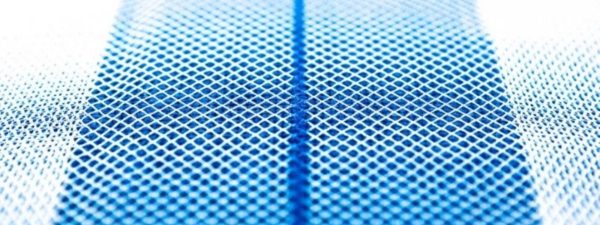Case Study: Ultralightweight medical textile for implantation
Client:
Multinational company that develops, manufactures and markets medical devices and services related to urology, continence and wound care.
Challenge:
The challenge was to develop an ultralightweight medical textile for implantation without compromising tensile strength.

Design:
- Critical to the design programme was selection of a low diameter USP Class VI yarn.
- An optimum ultra-light weight knit design with optimal pore size, tensile strength, stiffness and thickness was developed.
- Knit design also considered isotropy.
Build:
- Developed and documented a cost effective manufacturing method in a Class 7 cleanroom.
- Managed medical textile manufacture through post processing to retail pouching, labelling, and final packaging.
- Developed and validated all processes and test methods.
- Developed a custom heat set process, QC tests and other post processing activities e.g. laser cutting.
- Designed and procured all primary and secondary packaging components.
- Provided all documentation for DHF, DMR and DHR and regulatory submissions.
- Awarded a long term manufacturing contract by the Client.
Case Study: Innovative braided textile system
Client:
UK supplier of medical products to the First Aid, Occupational Health, Medical, NHS, Hospital and Retail sectors.
Challenge:
The challenge was to design and develop an innovative braided textile system to act as a novel adjustable catheter securement device for both nasogastric and canula end uses.

Design:
- Critical to the design programme was the selection of raw materials, and the design of test methods for evaluation.
- Design of an innovative braid system that offered both the grip/retention required and maximum flexibility over the size range of catheters which could be accepted.
- Design of an innovative snap connector which allowed securement of the braid system to adhesive patch.
Build:
- Provision of documentation for DHF, DMR and DHR and regulatory submissions
- Production of prototype devices
Case Study: A multi-component assembled collection of braids
Client:
UK company that designs, manufactures and distributes medical devices in the surgical spine market segment.
Challenge:
The challenge was to design and develop a superior replacement for a multi-component assembled collection of braids that were both complex to manufacture and caused usability issues due to the bulk of the transition where two of the braiding components joined.

Design:
- Designed and developed a one piece woven solution that removed the bulky elements of the original device and the complexity of manufacturing, whilst maintaining strength of performance
- Improved locking mechanisms of the woven textile in its holding block
- Designed a manufacturing process to produce devices to the agreed product specification
- Developed and validated all processes and test methods.
Build:
- Production of prototype devices
- Provision of documentation for DHF, DMR and DHR and regulatory submissions.
Case Study: Design and develop a manufacturing process for a medical device
Client:
Multinational company that develops, manufactures and markets vascular grafts, endovascular and interventional devices
Challenge:
The Challenge was to design and develop a manufacturing process for a medical device to meet client specifications.

Design:
Design
- Designed a manufacturing process to produce devices to the agreed product specification, and which minimised contamination due to environmental static.
- Developed and validated all processes and test methods
- Provision of documentation for DHF, DMR and DHR and regulatory submissions
Build:
- Awarded a long term manufacturing contract by the Client
- Sourced suitable equipment and installed within a Class 8 cleanroom
Our experts develop bespoke medical devices and implantable textiles.

